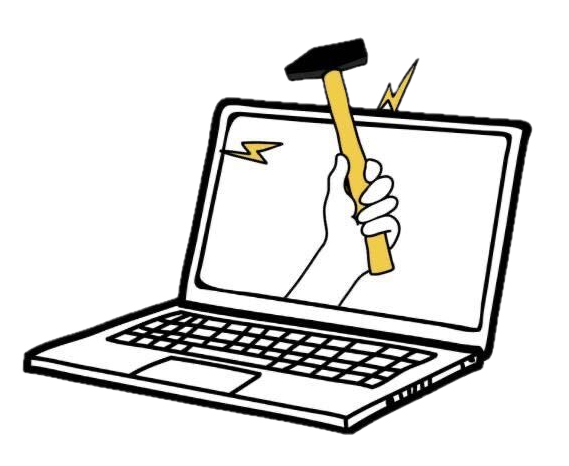A workers’ inquiry is a tool for workers to produce knowledge about their own work - and use this knowledge as a basis for organizing for something better. As an organizing tool, it gives workers a space to reflect on their conditions and consider the broader forces that shape them, as well as places they would like to see change, and potentials for how that change can come about. By going through this exercise together, we can better understand one another, identify key shared issues, and build solidarity. This particular inquiry was inspired by ones conducted at University of Michigan, a workshop at ACM FAccT, Data Workers Inquiry, and earlier from the inquiries conducted by Tech Workers Coalition.
To accompany this event in-person, you can use this neat single-page zine which debuted at Circuit Breakers ‘25. (Folding instructions here.)
Goals
- Understanding the impact of AI on workers: How is AI being promoted within our workplace? How is it impacting our work?
- Critically interrogating the phenomenon of AI hype at our workplaces: Why is our workplace investing in and evangelizing this technology? What resources are being invested in AI, and to whose benefit?
- (And more broadly: what is driving the current AI hype and AI-boosterism?)
- Collectively imagining what it might look like if AI design and investment was grounded in workers’ needs: Are workers’ needs best met via AI tech - or something else? How might investment in AI be antithetical to what we want from our workplace?
Practice
Print out this worksheet, and hand it out to your participants, or have them all bring up the webpage on their phones.This inquiry has two phases, which can be conducted by following the guidance below.
Inquiry Phase
Break your gathering into groups of four. Assign one person the interviewer, one person the interviewee. Have the interviewer inquire about the interviewee’s work (with discussion and commentary from the other two) for about 10-20 minutes. After that minute, switch roles among the group.
Use the suggested questions to guide your conversation. Keep in mind that this exercise is intended for us to get a better understanding of our work and working conditions. If you want to ask follow-up questions of your own, do so. Divert from these questions however you want.
About your work:
- What is your role or role(s) at your workplace?
- What do you see as the most socially valuable parts of your work?
- What sorts of things have made you feel supported, or unsupported, in doing the kind of work you find most impactful/valuable?
About AI in your work:
- How does AI impact your work?
- Do you feel that “AI” technologies are helping you and your colleagues to do the kind of work you find most impactful/valuable?
- Are you being encouraged to use or engage with AI? In what ways, and by who? What do you think these AI advocates see as the goal or value of increased AI adoption?
Why AI at your workplace
- What, or whose, values and priorities does your workplace’s investments in AI reflect?
- What impact do you think your workplace’s investments in AI will have for workers?
- Thinking back to the parts of your work you find most socially beneficial/impactful - what kinds of things could your workplace invest in that would support that work?
Sharebacks Phase
Once every group has had its discussion, the full meeting can be reconvened. Participants should share back any interesting insights that came up in their discussions. Afterwards, reflect as a group on these broader questions below, which will surface gaps of knowledge and opportunities for intervention:
- What else do we want to know about AI at our workplace? What are key research questions, and how can we answer them? How would we use this information to make material change?
- What mechanisms are available to ensure that AI investments at our workplace are accountable to workers and reflect their needs?
- What is one concrete step that you and your colleagues can take tomorrow to make AI at our workplace more accountable to workers?
Historical Note
The Workers Inquiry was developed in the 1800s by the workers movement at the time. Karl Marx wrote of it: “[Workers] alone can describe with full knowledge the misfortunes from which they suffer and that only they, and not saviors sent by providence, can energetically apply the healing remedies for the social ills by which they are preyed upon.”1
Its early history has been chronicled by Notes From Below.
-
A Workers’ Inquiry. Karl Marx, April 20, 1880 ↩
